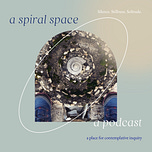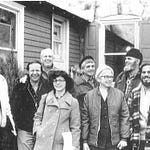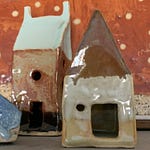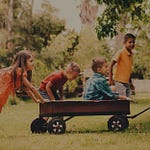Thanks for supporting this bi-weekly newsletter focused on contemplative practice and spiritual inquiry. Think of it as a bit of digital Spiritual Direction, or what I like to call “therapy for your God baggage.” For those of you who like to multi-task, I’m going to start posting an audio recording of the newsletter here at the top for you to play in the car or listen as you do dishes. Whatever. I hope this gives us another way to interact. Please always feel free to email me with your thoughts or questions or reach out if you think Spiritual Direction might be something helpful for you.
Have a great week! - Kelley
There are exercises I do in my class that work sometimes, some that work most of the time and some that work all the time. The triangle exercise, though simple, works all the time.
I ask students to walk around the room randomly. Then I tell them to choose another person in the room and keep them in their vision without letting that person know. After a minute I ask them to add a second person into their awareness. Now they are walking with their attention focused (surreptitiously) on two other people. Finally, I tell them to freeze where they are and to begin to adjust where they are in relation to their two people so that the points of all three form an equilateral triangle. Of course as they begin to move, their unknowing partners move as well and the whole room is negotiating space and people trying to come to some embodied consensus.
Through their frustrations and stay-where-you-ares shouted at each other, somehow they relax and allow the group to maneuver itself and eventually get to a place of stasis. Once there, a collective sigh and sense of deep accomplishment is felt in the room.
When I ask the students what they’ve learned from this exercise they state the obvious, but some see the deeper meaning — we are all connected.
The famous Harvard study on longevity has shown over and over throughout its 80+ year history that more than your relationship with your Peleton, your relationship with your great Aunt Bessie has more influence on your health. Joy over Genes. And the thing that gives us humans the most joy is having close relationships. We don’t need many, but we need a few.
Because like the triangle exercise, we are created for connection, for community.
This week we open the play Our Town at school. It will be the 30th play that I’ve directed at the high school. (give or take and not counting musicals)
I never thought I would direct Our Town. Too typical. Too saccharine. Too boring.
Little did I know this play, written in 1938 by Thorton Wilder is anything but. It’s actually avant-garde written to be done with minimal sets at a time when full-bore realistic box sets were all the rage. So it asks something of the audience. It asks them to use their imaginations and invites them to listen without any distraction. And it’s hardly saccharine. It is a play about sturdy people who find joy in the small things and suffer generously through the tragic. In fact, any ounce of sentiment or sugar coating kills the show immediately. My constant note to a room full of angsty teenagers was, “Stop playing the emotion! Simply use the words.” And the show is far from boring. It actually moves quickly. Like life.
Perhaps it’s because I’m towards the end of my time as a teacher, but I’ve never felt more present during a rehearsal process. Lines of the play hit me in a way I could never have anticipated when I read the play originally in high school or even 26 years ago when I started teaching.
The other day I teared up when trying to convey to the actor playing Mr. Webb, the town editor, the simply beauty of his description of the people of Grover’s Corners:
No, ma'am, there isn't much culture; but maybe this is the place to tell you that we've got a lot of pleasures of a kind here. We like the sun comin' up over the mountain in the morning and we all notice a good deal about the birds. We pay a lot of attention to them.
And yet, even in this town where people pay attention to the small things, the message of the play is that we go through life mostly blind to those we love. “Oh, Mama, just look at me one moment as though you really saw me,” Emily says as she returns to her childhood home in ghostly form.
I can’t help but take a catch-breath every time the actress says this line, as if I hear my own children saying, “Mom, did you hear me? Get off your phone.”
And as I constantly work out my own co-dependency issues, the advice from Doc Gibbs on the morning of his son’s wedding strikes true and wise:
They'll have a lot of troubles, I suppose, but that's none of our business. Everybody has a right to their own troubles.
And then there’s the choir director, Simon Stimson, who only has a few lines but his alcoholism and his past troubles, while never revealed, are discussed throughout the play. Most everyone has deep compassion for Simon in his suffering, they bear his burden with grace. But we see a man, even after death, consumed by resentment. And yet like the rest of the dead he is there at the end waitin’, “waitin’ for that eternal part in him to come out clear.”
Here’s the Stage Manager in Act III:
Now there are some things we all know, but we don't take'm out and look at'm very often. We all know that something is eternal. And it ain't houses and it ain't names, and it ain't earth, and it ain't even the stars ... everybody knows in their bones that something is eternal, and that something has to do with human beings. All the greatest people ever lived have been telling us that for five thousand years and yet you'd be surprised how people are always losing hold of it. There's something way down deep that's eternal about every human being.
You know as well as I do that the dead don't stay interested in us living people for very long. Gradually, gradually, they lose hold of the earth ... and the ambitions they had ... and the pleasures they had ... and the things they suffered ... and the people they loved. And they stay here while the earth part of 'em burns away, burns out; and all that time they slowly get indifferent to what's goin' on in Grover's Corners. They're waitin'. They're waitin' for something that they feel is, comin'. Something important, and great. Aren't they waitin' , for the eternal part in them to come out clear?
That feels to me like a collective cosmic sigh of relief. Waiting for something that’s coming that’s important - great even. And that great, important thing is for the eternal part of each one of us - that spark of divine light to come out clear. And Simon and Mrs. Soames, the woman who judges him harshly after choir practice, are right there next to each other, waiting on that cosmic miracle together.
This morning as I read my email before getting started on writing, I read a newsletter that was titled, A Foundation for the Common Good. It quoted Jim Wallis, founder of Sojourners magazine and author of The (Un)Common Good: How the Gospel Brings Hope to a World Divided. In it Wallis says,
“Christianity is not a religion that gives some people a ticket to heaven and makes them judgmental of all others. Rather, it’s a call to a relationship that changes all our other relationships. Jesus told us a new relationship with God also brings us into a new relationship with our neighbor, especially with the most vulnerable of this world, and even with our enemies. But we don’t always hear that from the churches. This call to love our neighbor is the foundation for reestablishing and reclaiming the common good, which has fallen into cultural and political—and even religious—neglect.”
- Jim Wallis, The (Un)Common Good
We are a country of community inextricably linked - both in our suffering and in our salvation. All you have to do is watch the new series Dope Sick on Hulu to see that the “sin” of addiction is not the downfall of a particular individual but has everything to do with the corruption of a system that allows drug manufacturers free license to hock poison.
The climate crisis is not due to any one person’s disregard for the Earth, but due to collective, willful ignorance and collective greed and consumption. The particularity of sin can be attributed much more to the universality of corporate sin. Like the triangle exercise, there are subtleties and nuances at work. Dualistic thinking doesn’t get at it. And playing the blame game is a cop out. No one is to blame and everyone is to blame. Both/And.
But in the same way that we can take responsibility for the suffering of our neighbor, we can also claim healing and hope for our neighbor as well. When each one of us step into deeper relationship born out of generosity and hope, we add to the Common Good.
As Wallis says, Jesus teaches us to love our neighbor as ourselves. That should take care of the common good, except too often our interpretation of “neighbor” is misidentified in our minds and leaves out way too many people. Often the people that need the most care.
Hebrew scripture* teaches us to take care of the widow and the orphan because culturally, that was the litmus test for a healthy society. If the orphan and the widow were taken care of then we could assume the good of all. In our culture widow-and-orphan might still be true, but we must add to that list. Certainly Jesus models love of the outsider and the poor, and let’s add the prisoner and the addict, the unhoused and the lonely, the sex worker and the drop out. Our list of those excluded from the Common Good is longer today than ever before.
All the more reason to return to our sturdy stock. When a belligerent man in the audience asks Mr. Webb whether anyone in Grover’s Corners is aware of social injustice and industrial inequality, Mr. Webb replies:
“Oh, yes - everybody is, something terrible. Seems like they spend most of their time talking about who’s rich and who’s poor. .. Meanwhile, we do all we can to help those who can’t help themselves and for those who can, we leave alone.”
Simple, really. We are created for community, for relationship. We are created to participate in the Common Good. What can you do today to help those who can’t help themselves? What can you do to support your community? How can you adjust just a little towards one way or another to make it possible for everyone to find his triangle?
* A previous version attributed this teaching to Jesus rather than as a traditional Jewish teaching of the Old Testament.















Share this post